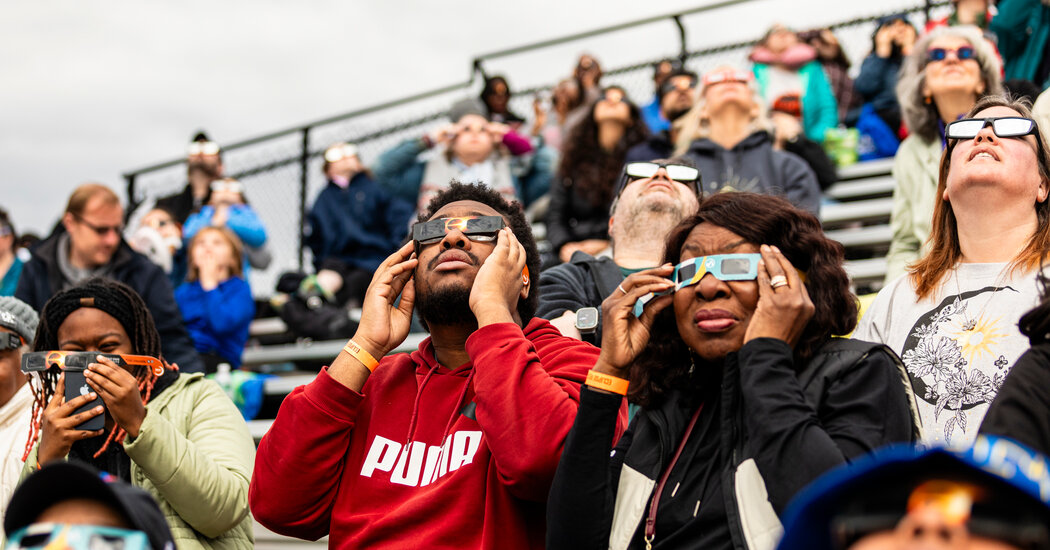Aidan Hernandez lay on the sidewalk wearing his eclipse glasses and staring up. The day was cloudy in Eagle Pass, Texas, and for a while he was silent. Then the clouds parted and the sun appeared, obscured by the moon.
“There it is! There it is!” said Aidan, 7, alerting everyone that the total eclipse was visible. “Now it’s gone.”
Eagle Pass, a border town facing Mexico across the green valley of the Rio Grande, was the first American city on the path of totality. The eclipse also passed over Houlton, Maine, a small town pressed between rolling potato fields and the international border with Canada.
In between, darkness raced across 2,500 miles of the United States. People gathered in the wide streets of Texas to watch. They fell silent on a soccer field in Arkansas, donned dark glasses at a baseball stadium in Cleveland, scribbled prayers on scraps of paper and burned them in drums beneath the old empty grain silos of Buffalo.
For this moment, a wide swath of this country did the same thing, together, happily and in wonder. Our world of divisions and distractions — of TikTok and politics and disasters — fell away, leaving us quiet with our breath held in awe.
“Wow,” said Joe Comacho, 54, who viewed the partial eclipse from a vintage train rolling through farmland near Arcade, N.Y. “It’s beautiful.”
An eclipse is a measured, foreseeable event. The Greek philosopher Thales is considered the world’s first scientist for successfully predicting an eclipse in 585 B.C.; an eclipse in 1919 proved that gravity bends light, an instrumental part of affirming Einstein’s theory of general relativity.
But for many Americans on Monday, the eclipse was a moment for reverence. The world went dark in the middle of the afternoon. The birds of Eagle Pass called it out, careering noisily over the rooftops of this city on the border, and Mireya Muñoz pressed her hands together to pray.
“I wanted to thank God because we are alive,” said Muñoz, 42, and because God “allowed us to see it.”
In Buffalo, Claudette Davis stood by a cottonwood tree and delighted in the eclipse as it played peekaboo with the clouds. “I’m totally open to light, love and energy today, and the clouds don’t disrupt it at all,” she said.
The Liverpool Legends, a Beatles tribute band, paused during their performance in Russellville, Ark., to marvel at the moment. “This is a big gig for us,” one of the singers said. “We’ve never opened for the sun before.”
Even for those not quite in the zone of totality, the potential to witness North America’s last total eclipse for the next 20 years was impossible to resist. Prospect Park in Brooklyn was packed and ready for a party, with hundreds spread out on its wide meadows. But on Lookout Hill, reached through a winding staircase in the trees, there was a hushed respect for the moment.
“There’s kind of a reverent thing to it,” Pauline McHugh said. “One of those things that binds people together.”
Some walked just a few blocks to catch a view. Others crossed states. Martine Raussin traveled from her home in Saint-Georges-sur-Cher, in central France, to see the eclipse over Niagara Falls. Her verdict: “It’s incredible,” she said.
The parking lot of the Marden’s department store in Houlton, Maine, was full of cars with out-of-state plates: Minnesota, Ohio, Texas. Fynn Eastridge, 14, and her brother Ember, 16, traveled from their home in North Carolina to Ohio, and then boarded a boat to watch the event from Put-in-Bay, a village on South Bass Island in Lake Erie. Carter Halberstadt traveled from his home in Wyandotte, Mich., to Cleveland, where NASA co-hosted an eclipse festival on the shore of Lake Erie. The event featured booths dedicated to the Artemis project, NASA’s plan to take astronauts back to the moon.
“I turned to my mom and I was like, ‘Oh my god, that’s the NASA administrator,” Mr. Halberstadt said. “I started freaking out.”
Do Trinh flew from his home in Amsterdam to Austin, Texas, where he boarded a special Delta flight timed to fly in the path of the eclipse. He glimpsed totality over the Missouri-Arkansas border, 30,000 feet up.
“I got goose bumps and all,” Mr. Trinh, 47, said. “There really is something magical about it.”
Little Rock, Ark., and Rockwood, Maine, had clear skies and an unobstructed view of the event. But for much of the afternoon there were clouds over Texas, Ohio and New York. In a field by a train depot in Wyoming County, N.Y., a crowd of 300 people fell silent as the sky grew dark. The day had started out sunny but turned gray. By the time of the eclipse, the sun was hidden behind a thick blanket of clouds.
Just then the depot’s bright white security light came on. Everyone groaned.
“The solar eclipse is canceled!” said Ethan Seltzer, 4, from Milford, Conn.
The sky over Houlton, Maine, was perfectly clear as the moon slid into perfect alignment with the sun. The crowd that had gathered in the town square grew quiet. Couples embraced, small flocks of birds darted over the square and orange light glowed on the horizon. Time seemed to stop. Three minutes later, too soon, sunlight flared.
“I would pay a million dollars to see that again,” said Sebastian Pelletier, 11, a Houlton resident.
Reporting was contributed by Sarah Maslin Nir, Michael Wilson, Christine Chung, Edgar Sandoval, Kenneth Chang, Jenna Russell, Gaya Gupta and Madeleine Hordinski.

